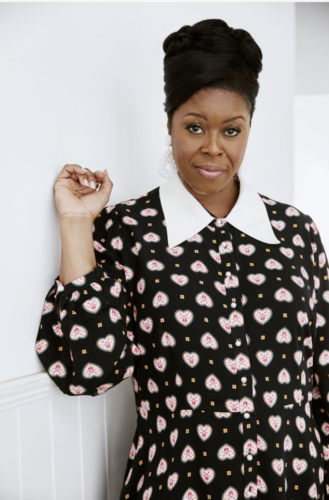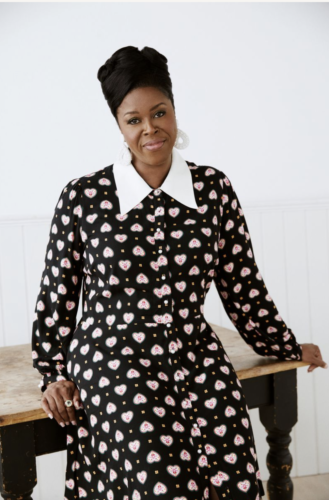Michelle Greenidge: From Southwark council to Steve McQueen
Michelle Greenidge is best known for her starring role in the Netflix black comedy Afterlife.
She has graced the stage and our TV screens for almost 16 years, working with some of the biggest names in the industry.
But it wasn’t always easy. The award-winning actress rose to stardom after 20 years of work at Southwark council, housing the homeless.
Ms Greenidge spoke to the South London Press about her starring role in the latest series of Doctor Who, working with Steve McQueen, and how her early life in South London shaped her career.
Just days away from the launch of the much-anticipated 14th series of Doctor Who, fans are preparing themselves to see Ncuti Gatwa taking over the Tardis as the 15th Doctor, alongside Ms Greenidge in a pivotal new role as Carla Sunday – a foster mother of 33 children.
Ms Greenidge said: “When I got the call I was bouncing off the walls.
“It’s such an iconic long-running show, it was phenomenal.”

Doctor Who, Series 14, will air on the BBC on May 11. Ms Greenidge, who previously worked with showrunner Russell T Davies on his Channel 4 series It’s a Sin, said: “The whole experience was lovely, with Russel it’s really important for him that you are happy.
“None of us take ourselves too seriously, and we were very comfortable with each other – sometimes we’d break into song and dance while reciting lines.”
Ms Greenidge praised the show for its powerful portrayal of a foster mother.
She said: “It was very different – not something you often see on screen – but they make such a massive contribution to our society.
“I had never experienced that kind of role before and I hope to see more of it.”
Ms Greenidge’s feature film credits include starring as Mrs Manning in Mangrove, the first film in Steve McQueen’s critically acclaimed Small Axe series.
The five-film anthology, an unprecedented project for the BBC, reflects black British experience from the late 1960s to the early 1980s. Each film is undercut by a desire to illuminate a part of recent British history that remains relatively untold.

Mangrove details the Mangrove Nine case in 1970. A group of black British campaigners who were tried on charges including incitement to riot after demonstrating against police harassment of the Mangrove in London’s Notting Hill, a restaurant that had become a meeting point for activists.
Ms Greenidge said: “Working with Steve was incredible. I was so nervous to meet him but he is a really cool guy and so relaxed, which meant I could bring my best work.”
On her first day on set, Ms Greenidge said she showed Mr McQueen an entry on her mobile phone.
She said: “I had made an entry five years before on the Steve McQueen project after it was announced in the press.
“When I had made the entry I wasn’t really in a place to secure that kind of position. So it was such an achievement for me to be working with him.
“He was staring at the phone for such a long time and then said it was amazing!”
Ms Greenidge’s first scene in Mangrove takes place in a police station after her character discovers her son has just been arrested.
She said: “It was my most difficult scene – my character loses the plot.
“Steve wanted to do it in three takes, starting with a rehearsal at 50 per cent speed. My heart dropped when he said that.
“That’s probably the only time I’ve gone against a director. I went at 95 per cent and we shot it in one take.
“Steve was so happy he picked me up – and I’m not a light girl.”
Ms Greenwich is known for delving deep into her characters, getting under their skin to pull off inspiring performances.
Her talent has not gone unnoticed. She was nominated in the Best West End Debut category at the Stage Awards 2018 for her part as Trudy in Nine Night at the National Theatre, and then went on to win the Best Supporting Female Actor at the inaugural Black British Theatre Awards in 2019, for the same role.
She said: “The script was brilliant.
“My parents are from a Caribbean background and I played a daughter left in Jamaica by a mother who moves to the UK. I knew people who had lived that experience, so I could draw on real life.
“I gave it everything and left my soul on that stage. It was a turning point in my career.”
Ms Greenidge said she also uses her own lived experiences to better understand the characters she plays. Having grown up in Peckham, she started working at Southwark council when she was just 16.
She said: “I’d always wanted to be an actor, but my parents wanted me to get a 9-5, so I would have security. I don’t hold it against them. I know they thought it was right for me at the time.”
After 14 months as a trainee, Ms Greenidge was launched into the local authority’s housing sector.

She spent her late teens and early 20s assessing homeless applications for accommodation, often working late into the night to take emergency calls.
She said: “It was rewarding. I helped house thousands of people and I still see them on the street and they remember me.
“Of course it’s difficult. Watching people fall on hard times, some who had suffered domestic violence or became homeless because of flooding and fire.”
Ms Greenidge said many of the relationships she built with those she was trying to help “took a toll”.
She said: “In that position you want to help everyone. Housing isn’t a blanket policy and when your right in it you see how different everyone’s situation is.”
Despite the strain, Ms Greenidge said she wouldn’t change any of it.
She said: “It helped me to grow. It’s informed the work I do now too. I know what it looks like and feels like – in a lot of roles I’m not acting.”
Ms Greenidge said growing up in the melting pot of South London informed her on privilege and empathy.
She said: “South London keeps it real.
“I grew up in Peckham which was full of amazing people but had a high crime rate and unemployment – obviously not so much now everything is so expensive there.
“I was so blessed that my parents could own their own house – which wasn’t a common thing then.
“It was tough at times, but it made me strong and opened my eyes to appreciate what I have.
“Class and status means nothing if you’re a good human being, that’s all it takes.”
For the younger generation of South Londoners, Ms Greenidge has one message.
She said: “Pursue your dreams and put in the work, I know it’s hard but just know you don’t have to settle.”
Pictured top: Michelle Greenidge styled by Arabella Boyce (Picture: David Reiss)
Everyone at the South London Press thanks you for your continued support.
Former Housing Secretary Robert Jenrick has encouraged everyone in the country who can afford to do so to buy a newspaper, and told the Downing Street press briefing:
“A FREE COUNTRY NEEDS A FREE PRESS, AND THE NEWSPAPERS OF OUR COUNTRY ARE UNDER SIGNIFICANT FINANCIAL PRESSURE”
If you can afford to do so, we would be so grateful if you can make a donation which will allow us to continue to bring stories to you, both in print and online. Or please make cheques payable to “MSI Media Limited” and send by post to South London Press, Unit 112, 160 Bromley Road, Catford, London SE6 2NZ






